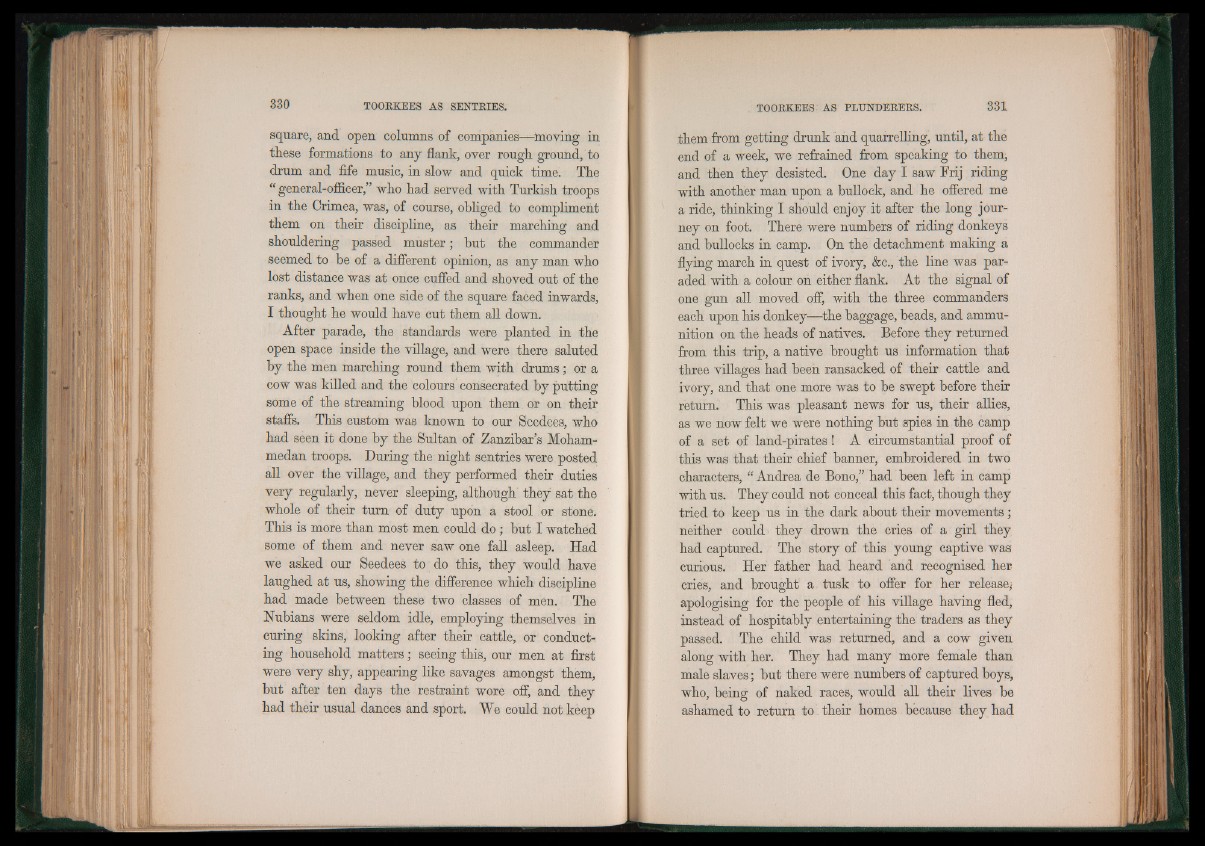
square, and open columns of companies——moving in
these formations to any flank, over rough ground, to
drum and fife music, in slow and quick time. The
“ general-officer,” who had served with Turkish troops
in the Crimea, was, of course, obliged to compliment
them on their discipline, as their marching and
shouldering passed muster; but the commander
seemed to be of a different opinion, as any man who
lost distance was at once cuffed and shoved out of the
ranks, and when one side of the square faced inwards,
I thought he would have cut them all down.
After parade, the standards were planted in the
open space inside the village, and were there saluted
by the men marching round them with drums; or a
cow was killed and the colours consecrated by putting
some of the streaming blood upon them or on their
staffs. This custom was known to our Seedees, who
had seen it done by the Sultan of Zanzibar’s Mohammedan
troops. During the night sentries were posted
all over the village, and they performed their duties
very regularly, never sleeping, although they sat the
whole of their turn of duty upon a stool or stone.
This is more than most men could do; but I watched
some of them and never saw one fall asleep. Had
we asked our Seedees to do this, they would have
laughed at us, showing the difference which discipline
had made between these two classes of men. The
Nubians were seldom idle, employing themselves in
curing skins, looking after their cattle, or conducts
ing household matters; seeing this, our men at first
were very shy, appearing like savages amongst them,
but after ten days the restraint wore off, and they
had their usual dances and sport. We could not keep
them from getting drunk and quarrelling, until, at the
end of a week, we refrained from speaking to them,
and then they desisted. One day I saw Frij riding
with another man upon a bullock, and he offered me
a ride, thinking I should enjoy it after the long journey
on foot. There were numbers of riding donkeys
and bullocks in camp. On the detachment making a
flying march in quest of ivory, See., the line was paraded
with a colour on either flank. At the signal of
one gun all moved off, with the three commanders
each upon his donkey—the baggage, beads, and ammunition
on the heads of natives. Before they returned
from this trip, a native brought us information that
three villages had been ransacked of their cattle and
ivory, and that one more was to be swept before their
return. This was pleasant news for us, their allies,
as we now felt we were nothing but spies in the camp
of a set of land-pirates ! A circumstantial proof of
this was that their chief banner, embroidered in two
characters, “ Andrea de Bono,” had been left in camp
with us. They could not conceal this fact, though they
tried to keep us in the dark about their movements;
neither could they drown the cries of a girl they
had captured. The story of this young captive was
curious. Her father had heard and recognised her
cries, and brought a tusk to offer for her release,'
apologisin g for the people of his village having fled,
instead of hospitably entertaining the traders as they
passed. The child was returned, and a cow given
along with her. They had many more female than
male slaves; but there were numbers of captured boys,
who, being of naked races, would all their lives be
ashamed to return to . their homes because they had